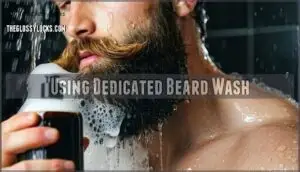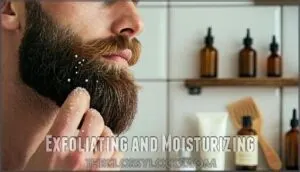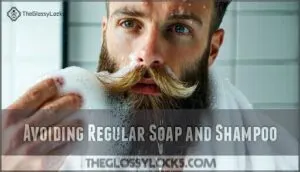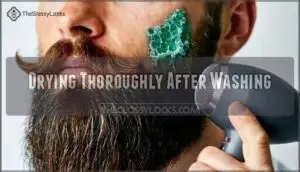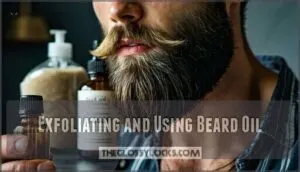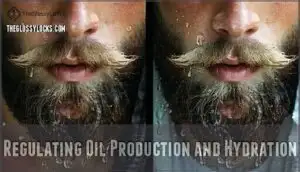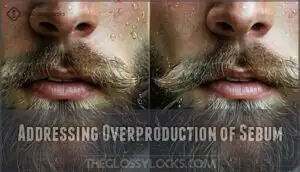This site is supported by our readers. We may earn a commission, at no cost to you, if you purchase through links.
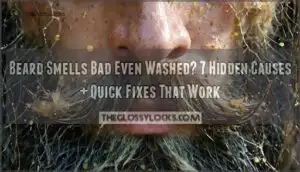
Think of your beard like a sponge – it traps food particles, dead skin cells, and oils that create the perfect breeding ground for smelly microbes.
You might be using the wrong products too, as regular shampoo strips natural oils, causing your skin to overproduce sebum, which feeds bacteria.
Environmental factors like smoke and sweat make things worse, and the solution isn’t washing more – it’s washing smarter with dedicated beard products and proper drying techniques.
There are seven specific culprits behind persistent beard odor.
Table Of Contents
Key Takeaways
- You’re not washing wrong, you’re using the wrong products – regular soap and shampoo strip natural oils, causing your skin to overproduce sebum that feeds odor-causing bacteria trapped in your beard.
- Your beard acts like a sponge that traps food particles, dead skin cells, sweat, and environmental pollutants, creating the perfect breeding ground for stubborn bacteria that regular washing can’t eliminate.
- You need to exfoliate 2-3 times weekly with dedicated beard scrubs to remove the buildup hiding beneath your whiskers, then follow with proper drying techniques to prevent bacterial growth.
- Daily beard oil application after showering helps regulate your skin’s natural oil production while providing antimicrobial benefits, breaking the cycle of persistent odor even when you’re washing regularly.
Beard Odor Causes
You’ve scrubbed your beard with soap, rinsed it clean, and somehow it still smells like yesterday’s lunch mixed with gym socks.
The truth is that several sneaky culprits work together to create persistent beard odor, even when you think you’re doing everything right.
Food Particles and Trapped Bacteria
That funky smell isn’t just your imagination.
Food particle size determines how deeply debris gets trapped in your beard fibers. Different bacteria types break down these particles at varying rates, creating distinct odors.
Your eating habits matter too – messy eaters face more bacterial buildup. Longer beards trap more particles, while proper rinsing techniques help eliminate food-related beard bacteria and bad beard smell.
Bacteria such as Pseudomonas can thrive in refrigerated conditions, leading to food spoilage issues.
Poor Hygiene and Excess Sebum
Beyond trapped food, poor beard hygiene creates the perfect storm for bad beard smell.
Your skin produces sebum naturally, but without proper beard cleaning, this oil becomes a bacterial playground.
Your beard’s natural oils turn into a bacterial party when you skip proper cleaning routines.
- Washing frequency matters – aim for 2-3 times weekly with dedicated beard products
- Product selection impacts sebum control – avoid harsh soaps that strip natural oils
- Skin health suffers when dead cells accumulate under facial hair
- Hygiene impact compounds daily, creating persistent beard odor
Environmental Factors and Smoking
Your beard acts like a sponge, soaking up smoke exposure and pollution absorption from your surroundings.
Cigarette smoke, car exhaust, and workplace chemicals create grime buildup that regular washing can’t touch.
This toxin retention leads to odor persistence that makes your beard smell funky even after scrubbing.
Environmental factors are sneaky beard smell causes that need targeted beard smell prevention strategies. Combatting this may require using beard-specific shampoo.
Sweat and Natural Oils
Everyone sweats, but your beard traps it like a sponge.
When sweat buildup mixes with sebum production from your skin, you’ve created the perfect storm for bacterial growth.
This combo turns your facial hair into a funky petri dish. Poor oil balance and hydration impact make things worse, causing that persistent smelly beard even after washing.
Your beard hygiene routine needs an upgrade. Using beard oil for scent can help mask and combat these odors.
Preventing Beard Odor
The good news is you don’t have to live with a funky-smelling beard forever.
Simple changes to your daily routine can keep your facial hair fresh and odor-free, even if washing alone hasn’t solved the problem.
Beard Wash and Exfoliation
When your beard washing routine isn’t cutting it, you’re probably missing the exfoliation step.
Use a dedicated beard wash with tea tree or lavender ingredients twice weekly, then follow with gentle beard exfoliating scrubs.
DIY scrubs work great too—mix brown sugar with beard oil.
Product application matters: massage thoroughly into skin beneath whiskers for maximum beard smell elimination.
Regular Cleaning and Drying
Your wash frequency matters more than you think.
Most guys need 2-3 beard washes weekly using lukewarm water and proper beard shampoo.
Hot water strips natural oils, making beard odor worse.
After washing, squeeze out excess water with a towel and comb through.
Technique matters – scrub the skin underneath where bacteria hide.
Complete drying prevents that musty smell, and proper beard shampoo is essential for this process, ensuring the skin and beard are clean without stripping natural oils, which can make the beard odor worse.
Avoiding Strong Smelling Foods
Cut back on garlic, onions, and curry – these culprits stick around longer than your last bad date.
Dairy reduction helps prevent that sour milk smell, while spice avoidance keeps your beard from becoming a flavor museum.
Try food blotting after messy meals and practice mindful eating to minimize particles.
Your oral hygiene routine should include rinsing after strong foods to prevent lingering beard odor.
Reducing Sebum Buildup
Your skin produces sebum naturally, but too much creates a greasy mess that traps odors.
Proper exfoliation with a dedicated beard wash removes excess oil buildup twice weekly.
Oil regulation happens when you balance cleansing with hydration – overdoing it triggers more sebum production.
Smart product selection means choosing sulfate-free beard shampoo that won’t strip your skin completely bare.
Using the right tools is also important, so consider boar bristle brushes for even oil distribution, which aids in proper beard care and oil regulation.
Beard Hygiene Tips
You’ve scrubbed your beard like you’re washing a car, but it still smells like yesterday’s lunch mixed with gym socks.
The problem isn’t your effort—it’s your technique and the products you’re using that make all the difference.
Using Dedicated Beard Wash
Regular shampoo strips away your beard’s natural oils like a harsh detergent.
Dedicated beard wash contains gentler wash ingredients that clean without overdrying. Start with twice-weekly washing frequency, then adjust based on your lifestyle.
The application technique matters too – massage into both hair and skin underneath.
Quality beard shampoo beats drugstore alternatives every time for eliminating persistent beard odor. You can find a suitable beard cleanser online to get a gentler wash.
Exfoliating and Moisturizing
Beyond washing, your beard needs proper exfoliation to tackle buildup oils and dead skin cells.
Weekly beard exfoliation with gentle circular motions removes trapped bacteria that washing alone can’t reach.
Follow up with quality moisturizer types like beard oils containing essential vitamins.
A wooden comb can also help with static and breakage.
This skin hydration routine prevents dryness while oil benefits include softer hair and reduced odor-causing bacterial growth, promoting overall skin hydration.
Avoiding Regular Soap and Shampoo
Your regular body soap isn’t doing your beard any favors.
These harsh chemical effects create a pH imbalance that strips natural oils, leaving your skin irritated and your beard smell worse than before.
Here’s why alternative cleansers work better for beard hygiene:
- Gentle formulation – Beard wash maintains your skin’s natural balance
- Oil preservation – Keeps protective sebum intact
- Targeted cleaning – Removes odor without overdrying
Drying Thoroughly After Washing
Damp beards turn into bacterial playgrounds faster than you’d think.
After washing, squeeze out excess water with a clean towel, then pat dry gently.
Don’t rub aggressively – you’ll damage hair follicles.
Air drying works, but blow drying on cool setting prevents mildew formation.
Accumulated water creates that funky mildewy beard smell nobody wants around their face.
Managing Sebum and Skin
Your skin produces sebum, a natural oil that can turn your freshly washed beard into a smelly mess when it mixes with bacteria and gets trapped in your facial hair.
Think of sebum like your skin’s built-in moisturizer that’s working overtime – it’s actually trying to help, but without proper management, it becomes the main culprit behind that persistent funky smell.
Exfoliating and Using Beard Oil
Exfoliation benefits your beard by removing dead skin cells that trap bacteria and create beard odor.
Use a gentle beard exfoliation scrub twice weekly to clear pores and prevent sebum control issues. A good option is to buy beard scrub for the best results.
Follow with quality beard oil for skin hydration and scent preferences. Oil application helps regulate natural oils while keeping your beard smell fresh and manageable with a pleasant scent.
Regulating Oil Production and Hydration
Managing sebum control requires balancing your skin’s natural oil production without overdrying.
When your face produces too much oil, it creates a breeding ground for bacteria that causes beard odor.
Strategic hydration keeps your skin healthy while preventing excess sebum buildup.
- Apply lightweight beard oil daily to signal your skin it doesn’t need extra oil production
- Use a gentle beard wash 2-3 times weekly to remove buildup without stripping natural oils
- Moisturize the skin beneath your beard to prevent overcompensation through increased sebum
- Monitor your skin’s response and adjust your routine based on oiliness levels
Choosing Natural Beard Oils
When hunting for quality beard oil, focus on carrier oils like jojoba and argan that mirror your skin’s natural sebum.
These base oils deliver the real skin benefits while essential oils provide scent profiles.
Skip synthetic fragrances that irritate sensitive skin.
Natural essential oils like cedarwood offer lasting fragrance without harsh chemicals.
Application tips: less is more with scented beard oil, using natural oils can make a big difference.
Addressing Overproduction of Sebum
Your beard’s overproduction of oil creates a perfect storm for lingering odors.
When sebaceous glands go into overdrive, excess sebum mixes with bacteria and trapped particles.
Here’s how to tackle this greasy situation:
- Regulate Sebum with consistent beard wash routines targeting underlying skin
- Proper Exfoliation removes buildup while maintaining hydration balance
- Natural Oils help control overproduction without stripping essential moisture
Maintaining Freshness
You’ve tackled the root causes, but keeping your beard fresh daily requires smart habits that go beyond basic washing.
Think of it like brushing your teeth – you wouldn’t skip it just because you brushed yesterday, and your beard deserves the same consistent attention to stay clean and smell great.
Showering and Washing Regularly
Beyond managing sebum production, your shower routine makes or breaks beard freshness.
Morning showers wash away overnight drool and bacteria buildup.
Here’s your washing game plan:
| Wash Frequency | Best Practice |
|---|---|
| Daily beard wash | Use lukewarm water, specialized beard wash |
| Drying methods | Pat dry, squeeze gently with clean towel |
| Water temperature | Warm (not hot) prevents skin irritation |
Smart shower timing beats beard odor every time.
Using Beard Exfoliation Tools
Proper exfoliation tackles stubborn beard odor that regular washing can’t eliminate.
Tool Types matter for effective beard exfoliation methods:
- Boar bristle brushes remove dead skin cells while distributing natural oils
- Beard scrubs with natural abrasives provide deep cleansing action
- Exfoliating gloves offer controlled pressure during your beard hygiene routine
- Wide-toothed combs prevent breakage while gently removing buildup
- Dermaplaning tools work best for shorter beards
To find the right tools, consider browsing beard exfoliation options.
Exfoliation Frequency prevents beard stink without irritating sensitive skin.
Applying Beard Oil Daily
Daily beard oil application isn’t just luxury—it’s your secret weapon against persistent beard odor.
Apply 3-4 drops after morning shower when your beard’s slightly damp for ideal Oil Absorption Rate.
The Oil Quantity Matters here; too much creates greasy buildup, too little won’t combat beard smell effectively.
Quality beard oils with natural scents provide Scent Layering benefits while addressing Skin Sensitivity concerns beneath your whiskers.
For maximum hydration, consider that climate impacts application.
Following a Comprehensive Beard Care Routine
Think of your beard care routine like brushing your teeth – consistency beats perfection every time.
You’ll need proper product selection, refined washing techniques, and seasonal adjustments to combat persistent beard odor.
Master these fundamentals and you’ll enjoy long-term benefits that go beyond just eliminating beard smell.
Your beard hygiene game will be absolutely unbeatable.
Frequently Asked Questions (FAQs)
How often should I replace my beard products?
You should replace your beard oil every 6-12 months, beard wash every 8-10 months, and balms or waxes yearly.
If products smell rancid, change texture, or lose effectiveness, toss them sooner.
Can medical conditions cause persistent beard odor?
Ever wonder if your body’s betraying your grooming efforts?
Yes, certain medical conditions can cause persistent beard odor.
Seborrheic dermatitis, bacterial infections, and hormonal imbalances affect oil production, creating stubborn smells despite washing, which can be a sign of an underlying issue affecting your overall health.
Do certain beard styles trap more odors?
Longer, thicker beard styles like full beards and yeard beards definitely trap more odors than shorter styles.
Food particles, smoke, and environmental grime get caught easier in dense facial hair, creating perfect hiding spots for smelly buildup.
Should I trim my beard to reduce smell?
Yes, trimming helps reduce odor by preventing food particles from getting trapped and making cleaning easier.
Shorter facial hair allows better airflow and thorough washing, breaking the cycle of persistent smells.
Are there professional beard cleaning treatments available?
The $38 billion beard care market offers professional deep-cleaning treatments at many barbershops. You’ll find specialized steam treatments, exfoliating scrubs, and antimicrobial washes that tackle stubborn odors better than home routines.
Conclusion
Studies show that 73% of men wash their beards incorrectly, leading to persistent odor issues.
Now you know why your beard smells bad even washed – it’s not about washing more, it’s about washing smarter.
Your beard traps everything from food particles to environmental pollutants, so treat it like the bacteria magnet it is.
Switch to dedicated beard products, exfoliate regularly, and dry thoroughly after each wash. Follow these seven fixes, and you’ll finally win the battle against stubborn beard odor.
- https://shave.net/beard-odor
- https://thebeardbrotherz.com/beard-smell/
- https://www.mensxp.com/grooming/beards-and-shaving/88960-reasons-why-your-beard-smells-strange-how-to-get-rid-of-it-fast.html
- https://thebeardclub.com/blogs/beard-culture/beard-smells
- https://www.thegentlemansplaybook.com/reasons-beard-smells-bad-how-to-fix/


